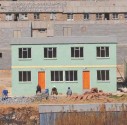Location
The Knowledge Exchange is a response to an identified need for increased information exchange in the Southern African region. It has been developed as a broad collaboration of partners, with the CSIR acting as the custodian.
The purpose of the Urban Knowledge Exchange is to improve the delivery of better quality human settlements, towns and cities by making reliable, evidence-based knowledge more widely accessible. It encompasses thematic areas such as sustainable human settlement development and management, better infrastructure and services, access to well-located land, efficient shelter production, a more functional residential property market, improved transport networks, more equitable urban development, good governance, building resilience and responding to climate change, and promoting more affordable housing finance.
The knowledge repository is devoted to promoting innovation and good practice for cities, towns, and villages through offering links to an online library, knowledge directory, upcoming events, moderated debates, portal (links to further hubs), and content uploading facility. With the aim to collaborate with existing platforms on various locational scales the project will further provide opportunities for global information sharing.
Members:
Resources
Displaying 41 - 45 of 45Urban land development in practice
This case study draws on research that sought to understand the process of urban land development in practice, from the perspectives of developers and municipalities. The research was undertaken by the Department of Town and Regional Planning, University of Pretoria, commissioned by Urban LandMark. The resource includes some learning and reflection activities based on the case study. These activities can be done individually or in groups, as appropriate for the learning session.
Informal land registration in urban areas
This case study examines specific examples of localised and informal land registration practices in South Africa. Such informal land registration often arises where people do not have access to the formal state system of land registration. But as the desire and need to gain access to urban land, to secure rights in relation to that land and also to trade land, a localised registration system that meets these needs tends to emerge.
Voices of the poor
This case study draws on research that investigated the perspectives and experiences of civil society organisations with regard to access to urban land by the poor. The research was conducted by Warren Smit, commissioned by Urban LandMark. An introduction to the case study is given below. On the back of this sheet some learning and reflection activities are provided. You can do these activities on your own or in groups, as appropriate for your learning session. Look carefully at these activities before you begin so you know what to look for while you are reading.
Urban land biographies
This report by Colin Marx and Margot Rubin explores how urban land is divided and re-divided within the context of the interaction between formal and informal land use management systems.
State of South African Cities Report
This is the first report to be issued by the SACN on the ‘State of South African Cities’. The report takes a hard look at the forces that have transformed the country’s largest cities over the decade since 1994 and asks, if the current trends continue, whether cities can expect positive or negative things in the years to come. As part of the process of celebrating 10 years of democracy, the Office of the President has led a ‘Ten Year Review’ to assess what has been achieved over the last decade, and to define the strategic challenges for the future.






